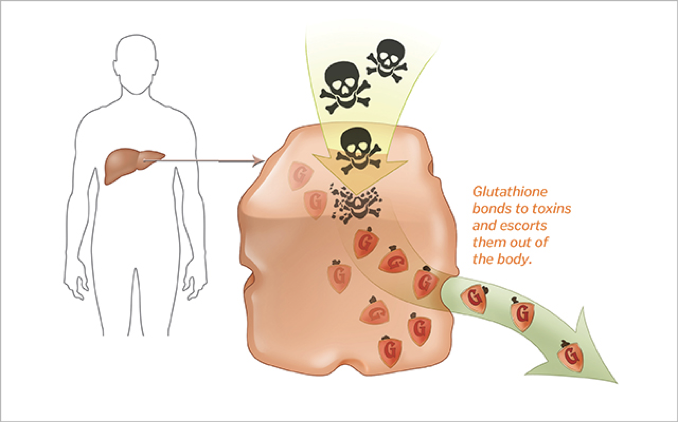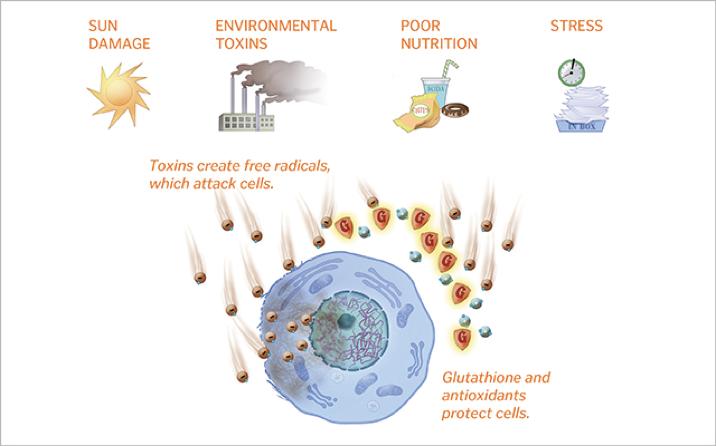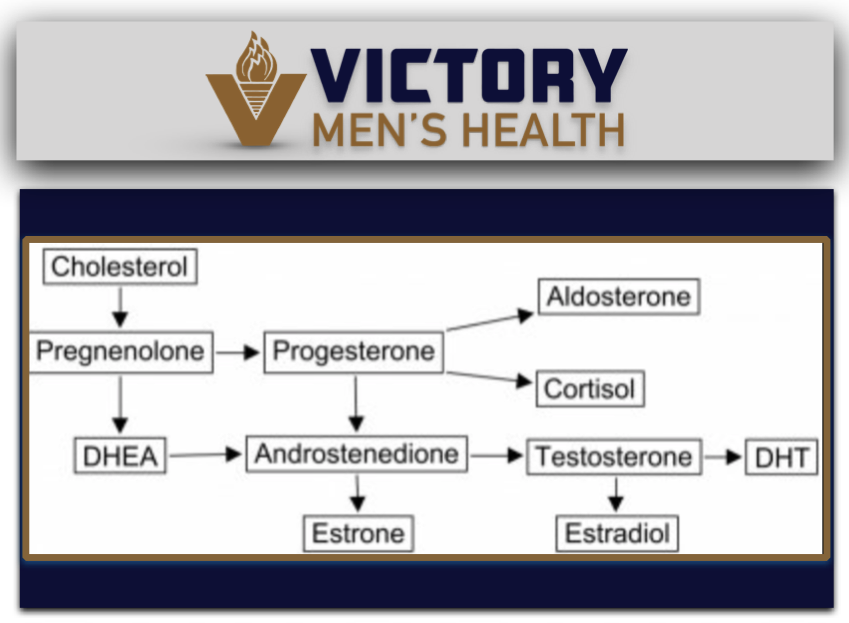What you should know
Despite nearly 90,000 medical articles written about the importance of a crucial molecule, many of us are chronically deficient and unaware! Glutathione plays a vital role in optimizing overall health. It is the secret to prevent aging, infections, chronic disease and even cancer.
What is Glutathione?
Glutathione, aka “Mother of all Antioxidants” is one of the main detoxifiers in our bodies and plays an imperative role in boosting immune health. We run into toxins on a daily basis: air pollution, glyphosates from food, and in water where trace elements and heavy metals often reside. That’s right – toxins are obtained regularly from our main sources of survival: air, food, and water.
Glutathione is an antioxidant that can make a huge difference in protecting our bodies. It is a sulfur-containing molecule, meaning its structure is sticky. Acting as fly paper, glutathione captures the toxins that enter the body by sticking to them as they are transported and excreted out of the body.

The good news is our body produces this simple molecule all on its own. The bad news is a modern lifestyle consisting of a poor diet, exposure to air pollution, radiation, medications, stress, trauma, aging, and infections all deplete glutathione in the body. High oxidative stress leads to high demand for antioxidants like glutathione. It becomes nearly impossible for the body to meet the supply of demand which leads to widespread deficiencies.
Normally, glutathione is recycled in the body, but when the toxic load becomes too great, the liver gets overloaded and damaged. Then, we are unable to regenerate the protective molecules. This leaves the body susceptible to even more oxidative stress, free radicals, infections and cancer because it cannot dispose of the toxins efficiently. Simply put, when glutathione becomes depleted, it leads to further sickness and chronic illness.

Glutathione also plays a part in fighting against infections. Living in a world where medical practitioners are seeing more and more antibiotic-resistant infections, it’s imperative to find alternatives. Glutathione plays a crucial role in regulating immune cells to help them fight infection. It also stimulates activity of natural killer cells that assist in destroying cancer, bacterial and viral infections. Glutathione is even thought to have inherent antibacterial properties alone.
Other benefits tied to glutathione include:
- Control inflammation
- Keep age-related health problems at bay (muscle/vascular health, bone density and cognitive function)
- Improve heart health
- Improve skin health
- Assist in the management of Parkinson’s, Alzheimer’s disease and dementia
- Help reduce the impact of uncontrolled Type 2 diabetes
How to optimize glutathione levels?
Now that you’re informed of the benefits, you’re likely wondering how you can assure optimal levels of this miracle antioxidant. Great news, there are things you can do to increase levels!
Diet
Because glutathione is a sulfur containing molecule, eating cruciferous vegetables such as broccoli, cauliflower, kale, collards, watercress and cabbage are incredibly beneficial. In addition, onions, garlic, and leeks assist in glutathione production along with beef, fish and poultry. Whey protein is another option that contains the amino acid building blocks and cysteine needed for the synthetization of glutathione.
Exercise
Get moving! Exercise helps boost your immune system and in turn, boosts glutathione in the body. 30 minutes a day of vigorous exercise like walking, jogging or playing sports can help, along with resistance training a couple times a week.
Glutathione supporting supplements
Oral forms of glutathione are largely ineffective due to the body digesting the protein. However, glutathione supporting supplements are recommended:
- Vitamin C and E (work together to recycle glutathione)
- Folate and vitamins B6 and B12 (help produce glutathione)
- Alpha lipoic acid (involved in detoxification)
- Milk Thistle (known for antioxidant properties and assists in boosting glutathione levels)
- Turmeric extract (studies show that it raises glutathione levels)
Glutathione IV infusions/injections
IV infusions and intermuscular injections allow glutathione to be delivered directly into the bloodstream, bypassing the digestive tract. This is a great alternative to oral supplementation where, as mentioned, the absorption is not guaranteed due to protein digestion. As an added benefit with IV infusions, cocktails can be specialized to include other supporting supplements to increase glutathione and are a great way to help in overall hydration!
It’s quite clear and convincing that adequate availability of glutathione is critical for maintaining overall health, protecting the body from toxins and promoting longevity.
In the world we live in it is near impossible to avoid toxins completely. Thankfully, science points us to the “Mother of all antioxidants” as an exciting potential option to prevent and/or treat infection and toxin overload.
Book your glutathione injection or infusion today!
References
